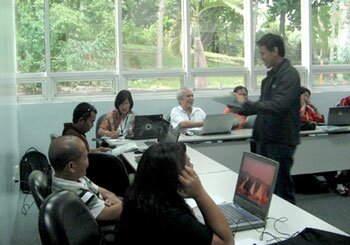 |
University of the Philippines scholar Rollan Geronimo conducting a training session
|
Modelling & Decision Support Working Group (MDSWG) students Deb Cleland, Rollan Geronimo and Jess Melbourne-Thomas presented their modelling tools at a national workshop on the application of ecosystem-based management (EBM) tools to coastal resource management in the Philippines this month.
The event was attended by more than 40 managers and policy makers from around the country, representing local governments, NGOs and regional-level management groups. The workshop provided training on different EBM tools, determined larger-scale applications of these tools, and gathered concrete support and commitments for “finding a way out for subsistence fishers in depleted fisheries in the Philippines”.
Deb has been hard at work in the Philippines since February 2010 and has run a series of stakeholder workshops, together with Rollan, in 10 different municipalities using her interactive modelling tool ReefGame. She coordinated a training session on ReefGame at the national workshop, where the tool was enthusiastically received.
Rollan, who is now co-supervising the EBM Tools Demonstration Project with Dr. Perry Aliño, conducted a training session on a systems dynamic fisheries model entitled Fishing Industries’ Support in Handling Decision Applications (FISHDA) developed through the Philippine Environmental Governance Project 2.
Jess presented her regional-scale Coral Reef Scenario Evaluation Tool (CORSET) which, together with other MDSWG modelling tools, will be available to users via a web portal in July 2010 (see above, Reefutures.org). A separate workshop organised by the Conservation International - Philippines for the Coral Triangle Initiative also made use of Jess' model results for crafting the Philippines' vision for the South China Sea Seascape.
The workshop was organised by Dr. Aliño and Rollan as part of the EBM Tools Demonstration Project, funded by the David and Lucile Packard Foundation, and was a direct offshoot of the work of the MDSWG over the last five years. It served as an important step in communicating the value of models as tools in decision-making and capacity building in coral reef and coastal resources management.
Contact: and